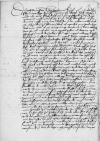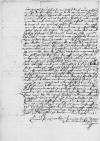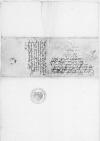Dem durchlauchten, hochgeboren furstenn und hern, / hern ⌊Albrechten⌋, margraff zu ⌊Brandenburg⌋, / in ⌊[Pr]eussen⌋, / zu ⌊Stettin⌋, ⌊Pomernn⌋, der ⌊[Cassu]benn⌋ und ⌊Wenden⌋ etc. herczogen, etc. meynn gnedigen, liben herenn
Negst hab ich vonn ⌊Gendt⌋ aus ⌊Flandrenn⌋ Ewer Gnaden ⌊⌋ / und geantwurt uff Ewer Furstlichen Gnaden ⌊⌋, / datum ⌊Konnigsberg⌋, 14 Februarii. / Ist mir neulich der sider abermols Ewer Gnaden ⌊⌋ zu kommenn, datum 2 Aprilis am palmtage, daraus Ewer Furstlichen Gnaden maynung vorstandenn, / wie Ewer Gnaden das penal mandat / mit eingelegter citacion entphangenn / und derhalbenn ⌊konigliche maiestet⌋, meynn allergnedigstenn hernn, ersuchenn lassenn, / begerend, / noch laut meyner commission vonn hochgedochter koniglicher maiestet, / die sache wolde befholenn habenn / und des thuns Ewer Furstlichen Gnaden person bey ⌊kayserlicher maiestet⌋ zu entschuldigenn etc. Hieruff, so hab ich im jungstenn schreibenn Ewer Gnaden in die lenge bericht, / was ich derhalbenn bey ⌊kayserlicher maiestet⌋ gethonn / und wie ungerne / und mit sverheit ir maiestet, / der sachen gancz zu wider, / mich gehort / und alles uff das ⌊Reich⌋ / und desselbenn regiment scheubet. / So hab ich dennoch uff dis mol nicht mocht nochlossenn, / meynemm befhelich noch / und das ich sunst gernn Ewren Gnaden dine, / ⌊kayserliche maiestet⌋ widerummb angesprochenn / und die selbige mit bekuemenn wortenn vonnn wegenn ⌊koniglicher maiestet⌋, meins allergnedigstenn herrenn, / angeredt, / der ⌊Kronenn vonn Polenn⌋ gerechtigheit uff das land zu ⌊Preussen⌋ / und die belhenung, Ewer Gnaden geschenn, / entdeckent, / do nebenn gebetenn, / ir kayserliche maiestet sich nicht wolt hirinnen vonn imants lossenn vorfuren weiter, / dan gemeiner fruntschafft / und bruderlicher lieb mit meymm allergnedigstenn herrenn wol erhaltennn, / zcymenn wil und geburenn etc. Disse maynung, mit weitlofftigernn wortenn darzu dynende vorfueret etc., hot mir ⌊ir maiestet⌋ / etwas milder, / dan zuvor, / geantwurt. / Es sey nicht in seynemm willenn, / sich kegenn ⌊meynen herrenn⌋ zu widernn, / sunder in aller freuntschafft, / wie bisher, / sich zu haltenn. / Es habe aber das ⌊Reich⌋ / und der gebrauch desselbtigenn / seyne gewonheit. / Do must ers bey lossenn bleibenn, / mit erbittenn, / wold ⌊meymm hernn⌋, / so vil im muglich, / zu willenn sein / etc. Aus dissemm antwurt / und gesicht, mir do bey gegebenn, / hab ich vorstandenn, / das ⌊ir maiestet⌋ nicht grossenn gefallenn trage aus solchenn brivenn und mandatenn, / die so aus gehenn. / Muss der kanczley, / die gelt do vor nympt, / seynenn brauch lossenn. / Hirummb wolt ich Ewer Gnaden gebetenn habenn / und, so vil es derselbenn leydlich, / rottenn, / wold mandat und cittacion, / die solcher gestalt, die belhenung belangend, / an Ewer Gnaden geschickt werdenn, / oder nicht an nhemenn, / oder an nhemend / wenig achtenn, / dann solch heut oder papir, / do eysen vorhandenn / unnd solche festigheit, / dar innenn Ewer Gnaden siczt, / nichts hindrenn mag, / ouch Ewer Gnaden wenig schadenn bringenn etc. Wie ich dan daraus weiter mit demm hochgelertennn hern ⌊doctor Hansenn Reynek⌋ gereth, / den ich, / so vil mir wissentlich, / von allenn sachen underricht hab, / weiter Ewer Gnaden an zuzcegenn, / wie ummb alles / unnd etwes mmher, / dan der fedrenn vortraut mag werdenn, etc. den selbigenn guttenn hernn, / der uff Ewer Gnaden schreibenn 2 Aprilis an mich gethonn, / zu der selbenn Ewer Gnaden sich im syn ist zu begebenn, / thue ich Ewer Gnaden / uff das hochste / und mit allemm fleis befelen, / bittend, / so in Ewer Gnaden uff meynn schreibenn gnediglich wil an nhemenn, / wold in ouch uff mein vorbit unnd befhelenn / wie eynenn geschicktenn, / wolerfarnenn, / vorstendigenn / und vilgelertenn / bey sich haltennn und mit billiger condicion vorsorgenn. / Ewer Furstlichen Gnaden mag in im ⌊Reich⌋ und allenthalbenn brauchennn. / Ist fast wol bekant / und bey idremm wolgewilliget. Halts ouch do vor, / so in Ewer Gnaden / bas wirt erkennenn, / werd in im ein getrewenn und geschicktenn diner findenn. Was wir hie vor newes habenn / und wie alle sachen zughenn, / wirt Ewer Furstliche Gnaden durch gedochtenn hernn ⌊doctorr⌋ weitlofftig und gruntlich bericht werdenn, / den ich nebenn mir Ewer Furstlichen Gnaden mit hochem fleis thu befelenn. / Got der almechtige gebe Ewer Furstlichen Gnaden in glukszeliger zunemunge lange gesuntheit. /


